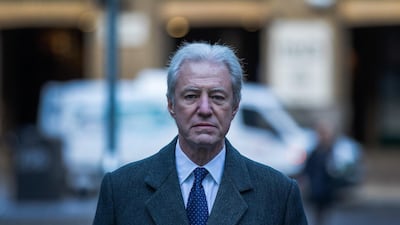The former chairman of Barclays Bank said on Tuesday that he had no qualms about taking investment from Qatar to bolster the capital levels of his ailing bank during the 2008 financial crisis.
Marcus Agius told a criminal trial of four former senior executives that Qatar had been in a strong position to dictate terms over an initial £2 billion injection but the investment was seen as “desirable” rather than essential in early 2008.
Mr Agius told the trial that the status of the Qatar Investment Authority as a sovereign wealth fund meant that it was seen as a beneficial partner for the bank to raise capital and for future investments using its “phenomenal” wealth.
Mr Agius’s comments came during his evidence as a prosecution witness at the trial of the bank’s former chief executive John Varley and three other men who are accused of playing key roles in a plot to hide secret fees to Qatar.
Britain's Serious Fraud Office accuses them of hiding payments of £322 million to Qatar and its ruling family in return for nearly £4bn of funding.
The fees were paid to the sovereign wealth fund and an investment vehicle controlled by former Prime Minister Sheikh Hamad bin Jassim bin Jaber Al Thani, a jury has been told.
Mr Agius told the court that he had not had any direct dealings with the Qataris but was aware of their interest in investing in Barclays which needed investment to avoid a British government takeover.
The executives were keen to push the investment through to ensure the bank remained in private hands and allow them to secure lucrative bonus payments, a jury has been told.
One of them warned that they would be “dead” without at least £1 billion from the Gulf state.
Mr Agius said that he sovereign wealth status of the Qatar Investment Authority was important for the investor’s credibility. “We saw they were interested dealing with us in a way that would be beneficial to us,” he told Southwark Crown Court. “That’s how we saw things in 2008.”
Mr Agius told the court that his relationship with Mr Varley was always “excellent” and considered him a man of the “utmost integrity” with a “formidable work-rate and someone who was committed to seeing the bank succeed”.
He said that he found the chief executive very open and never sensed that he “didn’t tell me anything he should have told me”.
The secret deal allegedly struck by Mr Varley and his co-executives saw Qatar secure fees based on 3.25 per cent of their investment, more than double the 1.5 per cent handed to other major investors.
Mr Varley, 62; Roger Jenkins, 63, the former head of investment banking in the Middle East; Thomas Kalaris, 63, and Roger Boath, 60, all deny charges of conspiracy to defraud.


